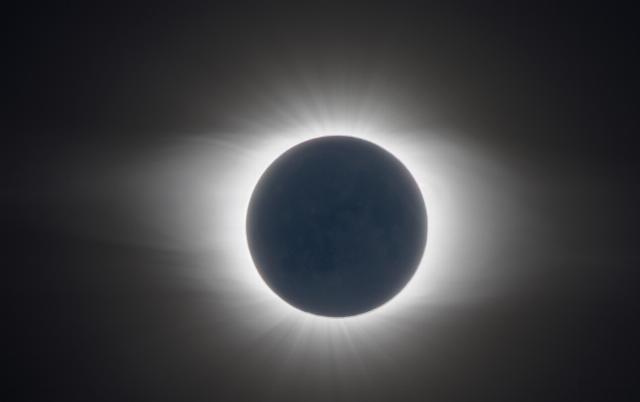
Hype is building around the solar eclipse that will be visible in the United States on April 8, especially for those who live along the “path of totality.” Many people intend to make a pilgrimage to take the “total” look, and some ceremonies planned have all the earmarks of religious observances.
The media are warning people to leave photographing the eclipse to professionals with special equipment that protects both the human eye and camera lenses. Many official alerts have been issued against using cameras or cell phone cameras, which can literally burn out.
As for me, I have no intention of eclipse-chasing.
My decision this year, as in years past, is not based solely on the warnings of possible eye damage if one looks in the direction of an eclipse, even with special glasses that might somehow fail.
One can certainly make a case from Jewish Law (halachah) that one should not look in the direction of a solar eclipse because of the real danger of risking one’s vision. After all, the Hebrew Sages interpreted the biblical verse, “Guard yourself, and guard your soul diligently” (Deut. 4:9) as prohibiting anything that might pose a risk to physical health and well-being.
True, the Prophet Isaiah urges us to look to the heavens in order to appreciate our Creator: “Lift up your eyes on high and see: Who has created these…[and] calls them by name.”(40:26) But sometimes the most profound message of religion is not to look.
Among synagogue rituals, a noteworthy mandate to refrain from looking occurs during the Priestly Blessing, when descendants of the cohanim or priests, garbed in their talitot (prayer shawls) bestow the ancient benediction (Numbers 6:24-6, “The Lord bless you and keep you,” etc.) with chant and choreography. This ceremony is known in Yiddish as “duchening,” from the Aramaic for the “platform” upon which the cohanim perform the blessing. There are strong traditions that one should not gaze upon them, but should listen intently to every word that they intone.
A Talmudic dictum suggested that those who gazed at the cohanim during their blessing in the Temple of old would suffer diminished eyesight, perhaps because the Sacred Name of God, which requires the utmost attention, was uttered. (Chagiga 16a) Some Sages taught that one should not look because the Shechinah, the brilliant and loving Divine Presence, shines forth from the “lattices” (Song of Songs 2:9) of the special priestly finger formations.
Later sages emphasized that one should not look because the spectacle would distract the onlooker from proper concentration on the blessing. That is why it is also customary for many Jews to cover their eyes when they are reciting the Shema (Deut. 6:4, etc.), the declaration of Divine unity and uniqueness and sovereignty in our lives through acceptance of the “yoke” of the mitzvot or commandments.
My own longstanding no-look approach to solar eclipses derives from my stance that we need to regard these events as incentives to reaffirm the Creator and the importance of privacy to the dignity of humanity’s Divine image. (Gen. 1:26)
Adoring the creation more than the Creator is not a new problem. I am not the first to associate it with a solar eclipse. The Hebrew Sages of the Midrash speculated that God created eclipses as a seeming one-upsmanship between sun and moon so that humanity might be discouraged from deifying sun or moon or both. But still, these rabbis observed, people worshipped the sun and moon instead of God, burning incense to created objects instead of to the Creator.
Some sages went so far as to conclude, on the basic of Scriptural verses, that the sun and the moon reluctantly go forth on their respective daily orbits, prodded by God, because they are embarrassed that people might worship them!
One best appreciates the earthly and heavenly spheres not by rushing to exalt the movement and concealment of heavenly bodies, but by resisting the impulse to venerate even the most magnificent and awe-inspiring natural phenomena and processes.
Only the Creator is worthy of our veneration and offerings as the One Who, in the words of the daily Hebrew prayer, “arranges the stars in their courses in the sky according to Thy will,” Whose miracles “are every day with us,” in the consistent laws of nature upon which we can rely and in which we continually find wonder.
Eclipses can inspire us to more fully appreciate the daily miracles that surround us in the normal processes of heaven—and earth. A good photograph of an eclipse can accomplish this, especially if we refrain from congregating along the “path of totality” and make our way instead to a regular worship service, choosing to affirm the path of Divine guidance. In Hebrew, Divine commandments are the basis of halachah, the “path” of religious law. Along earth’s paths, conservation of natural resources is a religious duty (Gen. 2:15) that must not become a religion of earth-worship, displacing the sacred bond between humanity and the Creator and thus the unique dignity and preciousness bestowed upon humanity by God.
A little boy cried to his grandfather, who was a Hasidic rebbe, that he was playing hide and seek with other children who walked away and did not look for him. The rebbe’s empathy for the boy extended to God, Who hides in order to be sought out by people who choose not seek the Divine. Rabbi Samuel Dresner observed in the Prologue to Prayer, Humility and Compassion that “just as the radiance of the sun, reaching everywhere, can be closed off by the palm of a hand before the face, so can the glory of God be shut out by the wall of the will before the soul.”
With regard to God and human beings, certain forms of not-looking help us to respect and love other people as God lovingly bestows dignity and infinite worth on humanity. The Hebrew Sages taught that the Gentile prophet Balaam admired that the tents of Israel were set up so that no dwelling impinged upon the privacy and the dignity of neighboring tents. Not-looking is essential to privacy, decency and morality. If anything, suggests the Talmud, an eclipse should prod us to look inward, to what within ourselves and society bolsters darkness when there is normally light. (Sukkah 29a)
In writing about “Privacy in Jewish Law and Theology,” Rabbi Norman Lamm made the striking observation that we must also respect God’s privacy: “The unknowable Essence or Absoluteness is the inner boundary of God’s privacy.” (Faith and Doubt, p. 302) Human beings, made in the Divine image, must appreciate the importance of privacy and restraint. Even the sun and the moon, as praised in the midrash cited above, would rather not be gawked at by human beings who violate, as it were, their celestial privacy by worshiping them.
God’s hiding is an invitation to seek out, with humility and restraint, the One Who “sees but is not seen,” to cite the Talmud (Chagiga 5b). Could it be that gawking at peek-a-boo events in nature, which are dangerous to the naked eye, anyway, will distract us from looking for the One Who seeks to be closer to us, and from the importance of the choice of not-looking, which is increasingly important in an age when privacy and restraint are constantly challenged?
<img alt captext="Wooter van Reeten” src=”https://conservativenewsbriefing.com/wp-content/uploads/2024/04/why-i-will-not-watch-for-the-solar-eclipse.jpg”>
Photo credit: Wooter van Reeten CC BY-SA 3.0 license




